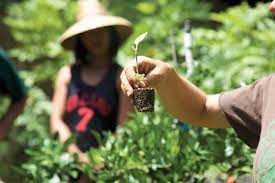
Farming allowed humans to put down both literal and figurative roots to create communities ranging from small rural towns to huge metropolises.
Though family farms have faded in favor of large commercial enterprises in the modern industrial world, smaller operations still exist far and wide.
In fact, you don’t have to have acres of land to enjoy farming. City-dwellers can plant beautiful and delicious vegetables in 5-gallon buckets on patios just as easily as someone can plant an acre of organic grazing grass.
Don’t let your farming dreams fade based on where you live. With a little bit of research and planning, you can get planting in no time.
Below are seven of the best plants for amateur farmers to grow.
Grazing plants
Grass and weeds make up a large portion of many farm animals’ diets. Ensuring you have the best pasture grass seed for horses, goats, or any other livestock you want to raise, is necessary before you bring the animals onto your property.
Fortunately, forage isn’t difficult to grow as long as you make sure to buy seeds suited to your location. Double-check that the seeds you’re buying produce forage suited for your chosen livestock.
Tomatoes
Tomatoes are perfect for the amateur farmer without a lot of space, as many varieties grow well in container gardens.
Simply purchase a 5-gallon bucket, drill holes in the bottom, and layer about an inch of rocks along the bottom. Next, fill with soil, install a circular trellis, and plant your seedling. Just make sure you place your plants in a sunny area, as tomatoes thrive on bright sunshine.
Cucumbers
Cucumbers are a healthy addition to small farms with minimal farming equipment. Similar to tomatoes, cucumbers thrive out of containers but are best suited for in-the-ground planting due to their desire to sprawl.
So, give your cucumber vines a large and sturdy trellis to climb, and you’ll enjoy cucumbers all summer.
Lettuce
Lettuce is an easy-to-grow vegetable that does best in the cooler months of spring and fall than in the blazing heat of summer. You want at least 5-6 hours of sun, but unlike fruit-bearing vegetables, lettuce can tolerate some shade.
Plus, lettuce is excellent for those lacking sunshine in their space. Just make sure your plants receive partial sun, steering clear from harsh, direct rays that can scorch fragile leaves.
Lettuce is also a perfect plant for those wanting to try hydroponics. This type of farming is a solid option for those without access to outside space but still want to give gardening a go.
Fortunately, various kits are available designed to work inside small apartments, built to be more practical and aesthetically pleasing.
Soybeans
Soybeans are grown worldwide for food, oil, milk, and more. They aren’t difficult to grow and are easier to contain than many other beans as they typically max out around two feet.
This feature makes them one of the easier beans to grow in containers for those short on space. Just remember, soybean cultivation requires warm weather and full sun to thrive.
Blueberries
Though you may be excited to harvest your first batch of blueberries, don’t expect a massive crop in your first year. Plants typically take two or three years before they begin producing a decent amount of fruit, which is especially true for berries.
So, you can expect the amount of fruit to increase until the plant reaches full maturity. Blueberries do well in either containers or the ground so long as you ensure they receive full sun and have adequate drainage.
Flowers
Amature farmers should never overlook the value of flowers. These versatile plants can be cut and sold or simply provide bursts of color to your farm. They also attract pollinators to your other crops, which can help increase their yields.
In particular, peonies and sunflowers are popular farm flowers due to their hardiness and attractiveness.
Parting words
The main lesson to remember when farming is you don’t have to live in the middle of nowhere to be successful. Livestock and certain crops require more space, but you can run a small-scale garden, yielding delicious produce year after year.
Even if you don’t have any outdoor space, you’d be amazed at what you can do with grow lights these days. So be ready to get your hands dirty and watch your garden bloom.